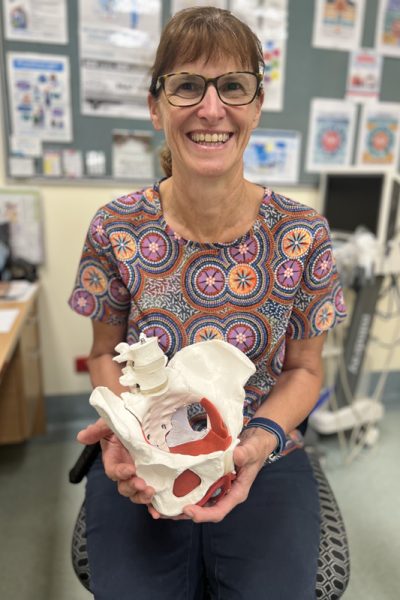Research aims to improve menopause journey for women in the workplace
Understanding the effects of menopause for women in the workplace is a strong focus for Caboolture Hospital physiotherapist Helen Edwards.

Caboolture Hospital Physiotherapist Helen Edwards is researching the effects of menopause for women in the workplace
Helen's research is focusing on work engagement and staff retention for the high proportion of workers who may be impacted by menopause transition.
"Women can have varying experiences of menopause. For some women it can be a quite a difficult time with a wide range of symptoms which can have a negative effect on their mental and physical health and impact on their ability to function in the workplace," Helen said.
"Other countries such as the United Kingdom and Ireland have done a lot of work to support women transitioning through menopause in the workplace. Australia seems to be behind in this area."
A Collaborative for Allied Health Research, Learning and Innovation (CAHRLI) Pre-RHD funding grant from Metro North Health is helping Helen prepare an application for a PhD through the University of the Sunshine Coast. Helen is developing a formal research proposal, sourcing ethics approval and other requirements before formally starting her research to better understand how women's experience of menopause in the workplace can be improved.
"I want to see if we can improve the journey for women in this group, which will improve mental and physical health outcomes as well as increase their engagement within the workforce and in turn improve the patient experience when they connect with our services," Helen said.
The research builds on Helen's work as a pelvic health physiotherapist. For more than 25 years, Helen has regularly seen women from 16 years of age to those aged in their 90s.
"It's a really interesting role; it can be very challenging at times as some of the patients' concerns can be very complex," Helen said.
"There can often be many underlying issues such as previous trauma or psychosocial factors involved – these are very personal issues that women are seeking help with.
"It's also a very rewarding role – when patients feel like they have been heard and can start to see improvements in symptoms that have been having such a significant impact on many areas of their life."
Helen undertook her first research project in conjunction with the Royal Brisbane and Women's Hospital and Caboolture Hospital physiotherapy departments, thanks to a novice research grant funded by the Allied Health Practitioner Research Scheme in 2015.
She studied the effectiveness of gynaecology physiotherapy screening clinics in improving access to care and health outcomes for women on gynaecology outpatient waiting lists.
Those initial investigations culminated with Helen presenting an extended abstract on the effectiveness of gynaecology physiotherapy screening clinics at the International Continence Society Conference in Florence, Italy in 2017.
However, it's the effect of menopause on women in the workplace – most commonly in their 40s to 60s – which is now the key focus of Helen's new research journey.
